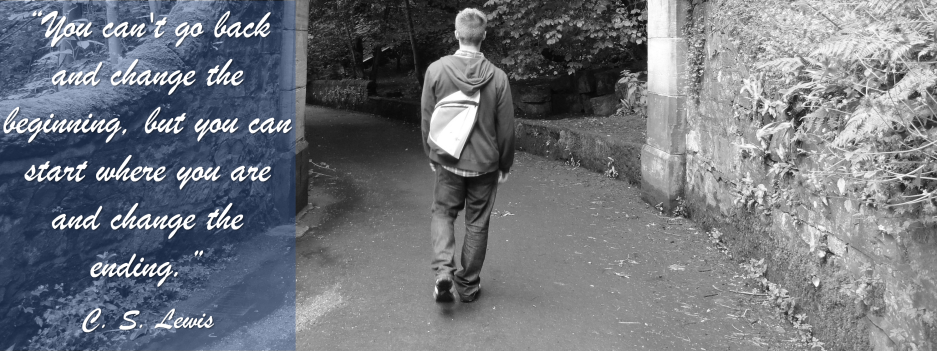Header image credit: me // Featured image credit: me
“Watch your thoughts, for they become words; watch your words, for they become actions; watch your actions, for they become habits; watch your habits, for they become your character; watch your character, for it becomes your destiny.”
Various/Unknown
Apparently, versions of this quote have been attributed to various people, from Lao Tzu to Buddha to Emerson, but that’s beside the point; I share it not to start a debate over who said it first, but to highlight the power of thought. As psychological research (particularly the field of positive psychology) shows us, our thoughts can exert a noticeable—even a substantial or powerful—effect on our lives, for better or worse, depending on the nature of the thought pattern: more negative thoughts are associated with more negative effects; more positive thoughts are associated with more positive effects. So, in the spirit of positivity, let’s focus on the positive and how to improve overall feelings and well-being. And since we just had Thanksgiving, I want to focus on a specific kind of positive thought, one that Cicero once called the parent of all virtues: gratitude. Let’s explore what makes it so virtuous—and powerful.
Thankfulness and Sleep
Research done by Wood et al. (2009) shows that gratitude likely has a positive effect on sleep (and, as you may know, sleep is critical to our overall emotional and physical well-being, so this is a biggie). Granted, this was not an experimental study (rather, it was correlational), meaning we can’t draw firm causal conclusions; nonetheless, they found that people who tend to be more grateful also tend to sleep better. In particular, negative thoughts before bed were associated with poorer sleep (and positive thoughts with better sleep), and greater gratitude was associated with fewer such negative thoughts, meaning that gratitude might be our secret weapon in the fight against those unpleasant thoughts that can keep us up at night and keep us from a good night’s sleep. (So, basically, Irving Berlin was way ahead of the science when he wrote the lyrics, “When I’m worried and I can’t sleep, I count my blessings instead of sheep.” That’s some solid science right there!)

Image credit: Simon Infanger (freely available via Unsplash)
But that is just a sample, just a tiny slice of the (pumpkin?) pie of what gratitude can do, its effects being as manifold as a turkey’s tail feathers. (I had to make some Thanksgiving puns. Again, not sorry.) Let’s look at some more.
Thankfulness and Attitude
In a 2008 longitudinal correlational study by Wood et al., it was found that gratitude at a particular time was associated with significantly lower measures of stress and depression weeks later. Moreover, this effect was independent of personality effects, meaning that, by being grateful, even people who are naturally more disposed towards negative emotional states and/or who are less disposed towards positive emotional states can experience the same positive mental health effects as those who are naturally disposed towards positive and/or away from negative states. Remember, even Scrooge made a turnaround. Gratitude trumps personality. You have the power to make the choice in this, my friend. (Caveat: because it’s a correlational study, we can’t draw firm causal conclusions, but, because it was longitudinal, we have an opportunity to better assess directionality in terms of which variable seems to change first, which allows us to more confidently assume which direction causality may be going. There’s part of your mini research methods lecture for the day.)

Image credit: Zac Durant (freely available via Unsplash); quote added
In an experimental study by Emmons and McCullough (2003), participants who were prompted for 10 weeks to count their blessings reported a more positive outlook on life than those who were prompted to recount some of their hassles. (Being a true experiment, we can actually draw causal attributions here. Yay!) The blessings-counters also reported fewer health symptoms and more hours of exercise in a week than their hassle-recounting counterparts (more on why below). In the second study, the blessing-counters also had higher overall levels of positive affect, which could include states or emotions like happiness, hopefulness, joyfulness, appreciativeness, and more. In the third study, blessings-counters (this time in comparison to people who counted neither blessings nor hassles) reported getting more sleep at night and waking up feeling more refreshed. Thus, the suppositions made from by Wood et al.’s (2009) correlational data are borne out with experimental evidence: giving thanks does lead to better sleep. (Another alternative, which correlational data can’t rule out, would have been that getting better sleep leads to being more thankful. This experimental evidence, where variables were manipulated, allows us to see how a change in the gratitude variable caused a change in the sleep variable. Thus, now we can argue that gratitude leads to better sleep. Thus ends our mini lecture on research methods.) Also, the blessings-counters had higher overall levels of positive affect and lower overall levels of negative affect, indicating that being grateful leads to a more general positive attitude and outlook on life.
(It would seem that the Apostle Paul, like Irving Berlin, was well ahead of the science, advocating tenets of positive psychology centuries before it would become a field of empirical study, when he penned, “in everything by prayer and supplication with thanksgiving let your requests be made known to God. And the peace of God, which surpasses all understanding, will guard your hearts and your minds in Christ Jesus” [Philippians 4:6-7; emphasis added]. Granted, we’re talking about God, so there’s more power at work than simply positive psychology and being grateful, but the connection between thankfulness and peace is clear. After all, Scripture is Truth, so it stands to reason that science, which is the search for fact and the discovery of what is true, should support the truth claims of Scripture.)
Thankfulness and Health
But the effects of gratitude are not limited to positive affect. On a more cognitive note, as Emmons and Mishra (2010) review, gratitude may actually increase the brain’s access to and ability to retrieve positive memories, thereby leading to an overall positive bias of memory (i.e., you recall more fond memories and you recall memories more fondly). In the social realm, people who are more grateful also tend to be more empathic, forgiving, trusting, generous, and willing to help. In other words, a grateful person makes a great person to have as a friend. On top of gratefulness’ contribution to making friendships stronger, it may even help facilitate the establishment of new friendships, perhaps via creating emotional openness or encouraging opportunities to reciprocate kindness. Regarding physical benefits, gratitude can have positive physiological effects, such as helping to ease problematic functioning in individuals with hypertension or neuromuscular disease (among all the health benefits that can come from sleeping better and having less chronic stress, which are many).
Why these effects? What is so powerful about gratitude? As Emmons and Mishra argue, it could be due to one or more of several reasons.
- Gratitude reduces stress (e.g., trauma sufferers who are more grateful tend to report fewer incidence of PTSD), and chronic stress, aside from being subjectively unpleasant, can have a extensive array of negative psychological and physiological repercussions.
- Gratitude is associated with making fewer social and/or personal comparisons—the kinds that can lead to envy and/or regret, which are emotions that can be unpleasant and unhealthy.
- Grateful people tend to report lower levels of materialism, and materialism is associated with dissatisfaction, unhappiness, and low self-esteem.
- Gratitude can promote healthy social relationships, and a good social support network can have a wide array of positive physical and mental benefits.
- Gratitude may promote better physical health practices (as seen in the Emmons and McCullough [2003] data), which will have positive physical and mental health benefits.
- Lastly, as Emmons describes in his chapter (“Gratitude, Subjective Well-Being, and the Brain”) of the 2008 book The Science of Subjective Well-Being, gratitude and its associated memories, processes, and positive affective state are likely instantiated in two interconnected areas of the brain: the limbic system, which subserves many of our emotional processes, and the prefrontal cortex (PFC), which, as I discussed in my last post, is responsible for our executive functions and controlled thoughts. Thus, gratitude is under our control (the PFC is largely under conscious control) and yet has subconscious elements (the limbic system is generally not under conscious control, hence why emotions tend to be so visceral and automatic—and, I daresay, irrational, at times), which is why it can exert strong and lasting influences on our minds and bodies (the subconscious mind is powerful, indeed).
So, there you have it—or at least some of it. There is a cornucopia (O, look, I did it again) of research on the power of gratitude, and this is merely a snapshot. But even this snapshot is enough to make me want to be more intentional about being grateful.

Image credit: Pro Church Media (freely available via Unsplash)
Final Thoughts
That being considered, let me end with an encouragement—to all of us, myself included—to practice more gratitude today—and every day. The positive emotions and memories that accompany gratitude just may have unanticipated, long-term mental and physical health benefits—something else we can then be grateful for. But, I also want to urge us to not simply feel gratitude and practice being thankful, but to express that gratitude and actually give thanks. What’s the difference? Well, gratitude can be a very personal thing, simply requiring that one appreciate and be grateful for the blessings in one’s life. However, giving thanks, like giving anything else, requires a recipient; thanks must be given to someone. And while I could not find it explicitly mentioned in the articles I read, I have to imagine that at least the social benefits of gratitude are most strongly elicited—or perhaps only elicited—when that gratitude is expressed and thanks are given to another person. I mean, how am I supposed to know that you’re grateful if I never see you express that gratitude?
So give thanks. And make it heartfelt and specific. Let others know why you’re thankful. At least from anecdotal experience, gratitude lands more powerfully that way. Here’s a great example: I attended a wedding last month for a couple of my friends; as a gift, I gave them some of the wine glasses off their registry (among a few other little things). Several days ago, one of them sent me a text saying, “Thank you for the wine glasses, dear friend!” It was unsolicited; it was genuine. (Not that I’m calling the official “Thank you” notes for wedding gifts disingenuous, and not that I begrudge them, but there seems to be something more heartfelt about a “Thank you” when it is not also a social expectation.) Needless to say, I felt the gratitude. And as a bonus, she included a picture of one of the glasses being used. That showed me on a deeper level that the gift was appreciated, and that made me feel appreciated. It warmed my heart.
So express your gratitude. It just might go further and do more than you thought—for you, and for others.
And after all that, I’d be remiss if I didn’t express my gratitude, so thank you for reading!
Yours truly,
D. R. Meriwether, Ph.D.
Renaissance Man and Abundant Life Liver


7 thoughts on “What Giving Thanks Gives You”